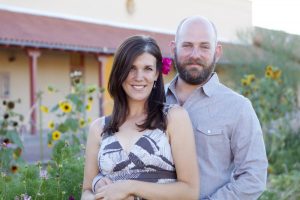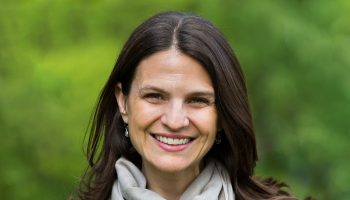
When Emily and Stuart Siegel came to Ajo, Arizona, as part of what they called their “Big-Ass American Adventure,” they were struck by both the natural and architectural beauty of the town.
“There was an opportunity (in Ajo) that we had been hoping to create for ourselves elsewhere, and it just presented itself to us right here,” said Stuart Siegel, co-director of the Sonoran Desert Inn & Conference Center along with his wife, Emily.
At the time of their road trip, the Sonoran Desert Inn was still under construction as part of a project by the nonprofit International Sonoran Desert Alliance.
The building was originally an elementary school annex built in the 1940s; the ISDA enlisted the expertise of Tucson architect Rob Paulus to help transform it into the Sonoran Desert Inn.
At 2 p.m. today, July 4, in the Hall of Philosophy, the Siegels will continue the Interfaith Lecture Series by asking “How Many Shrimp Tacos Does it Take to Save an Impoverished Former Mining Town?” as part of Week Two’s interfaith theme, “Common Good Change Agents.” The Siegels will be in conversation with James Fallows, a reporter for The Atlantic and founder of its American Futures project.
Siegel said the decision to stay in Ajo came about during a volunteering stint with the ISDA.
“A lot of people had been coming here and visiting for a long time, but there had never been a place that was a central destination,” he said. “We’re not just a hotel — we’re proactively marketing this town.”
The Sonoran Desert Inn, according to Siegel, functions for Ajo the way a convention and visitors board does for a larger city.
“We work a lot with the (Ajo) Chamber of Commerce; we do a lot of marketing and make connections that bring visitors and press here,” he said.

Around the same time the Siegels first traveled to Ajo, Fallows and his wife, Deborah — who is a fellow for the nonpartisan think tank New America — were visiting the town for The Atlantic as part of their own trip across the United States for the Futures project.
“Ajo, Arizona, is geographically spectacular,” Fallows said. “Sociologically, there’s a tri-national alignment of people there, including the people of the Tohono O’odham tribe.”
But while Siegel and Fallows said the Sonoran Inn had become a cultural hub for Ajo, Siegel emphasized that Ajo’s cultural growth cannot be solely attributed to him and his wife.
“Things in Ajo go through cycles,” Siegel said. “We’re definitely not able to say, ‘the town was in a state of disrepair, and we came in and now it’s magically flourishing.’ That’s not at all the reality.”
According to Siegel, narratives of that nature are often the result of classist or racist prejudices.
“(Some people) want to hear that a couple people with a few good ideas magically saved the town,” Siegel said. “That’s a problematic way to think about things.”
Still, Siegel said he’s “proud to contribute to increased visitation” of Ajo.
“We have a Tuesday night meal series where we give some local chefs the chance to cater for the community,” he said. “We also have the only monthly shrimp taco night in town. We’ll definitely take credit for that one.”




